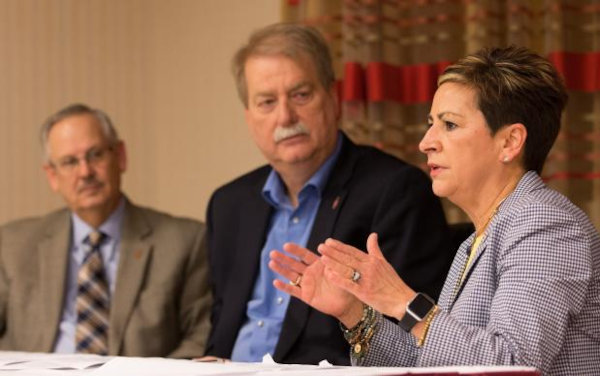With nine months to go before a special General Conference, Bishops and Judicial Council provide input.
SAM HODGES
United Methodist News Service
The Council of Bishops has issued a clarifying statement about its recent recommendation based on the work of the Commission on a Way Forward.
The May 18 statement from the council says that its members voted by an “overwhelming majority” to share the commission’s work and to recommend the One Church Plan to the special General Conference of The United Methodist Church, which will meet early next year.
The One Church Plan would remove from church law the statement that the practice of homosexuality is against Christian teaching. It would give clergy, local churches and conferences more freedom with practices that are currently restricted by the Book of Discipline, such as performing and hosting same-sex weddings, and ordaining openly gay persons as clergy.
The bishops’ new statement says: “The One Church Plan will be placed before the General Conference for legislative action.” It also says the bishops will provide supplementary materials about two other options, the Traditionalist Plan and the Connectional Conference Plan. Bishop Kenneth Carter Jr., president of the Council of Bishops, declined to elaborate on the press release.
Texas Conference Bishop Scott Jones has maintained that he and some other bishops understood that all three plans would be put before the special General Conference for action. Specific vote totals have not been released by the council or any individual bishops.
Jones could not immediately be reached for comment on the new press release.
The bishops issued a May 4 press release saying they had “strongly approved” a motion with an accompanying rationale. The motion was included in the press release, and noted that all three plans would be in their report to the special General Conference, with One Church getting the council’s recommendation.
The motion did not spell out which plan or plans would go forward as legislation, and from around the church there were questions about whether one or all three would be put before the special General Conference. In communications with their conferences, bishops offered varying characterizations of the recommendation.
The denomination’s Judicial Council will be in special session next week to consider arguments about the scope of petitions for the special General Conference. Bishop Bruce R. Ough, immediate past president of the Council of Bishops, and Jones have submitted briefs arguing different positions, and both are expected to speak at a May 22 oral hearing in Evanston, Illinois. Ough and a group of United Methodist chancellors argue that only petitions consistent with the bishops’ own report to the special General Conference would be in order, given the rationale or “call” for the special meeting.
But others, including Jones, have written briefs holding that a broader approach is required under church law. Both sides acknowledge that under church law the special General Conference can, by a two-thirds vote, expand the agenda.
At the request of General Conference 2016, the bishops agreed to try to lead The United Methodist Church toward as much unity as possible, given long-standing division over homosexuality, and the commission has been working with the bishops in that effort for about two years.
The bishops called the special General Conference, which will be Feb. 23-26, 2019, in St. Louis, to focus solely on the church’s positions on human sexuality.
Last Updated on November 1, 2023

